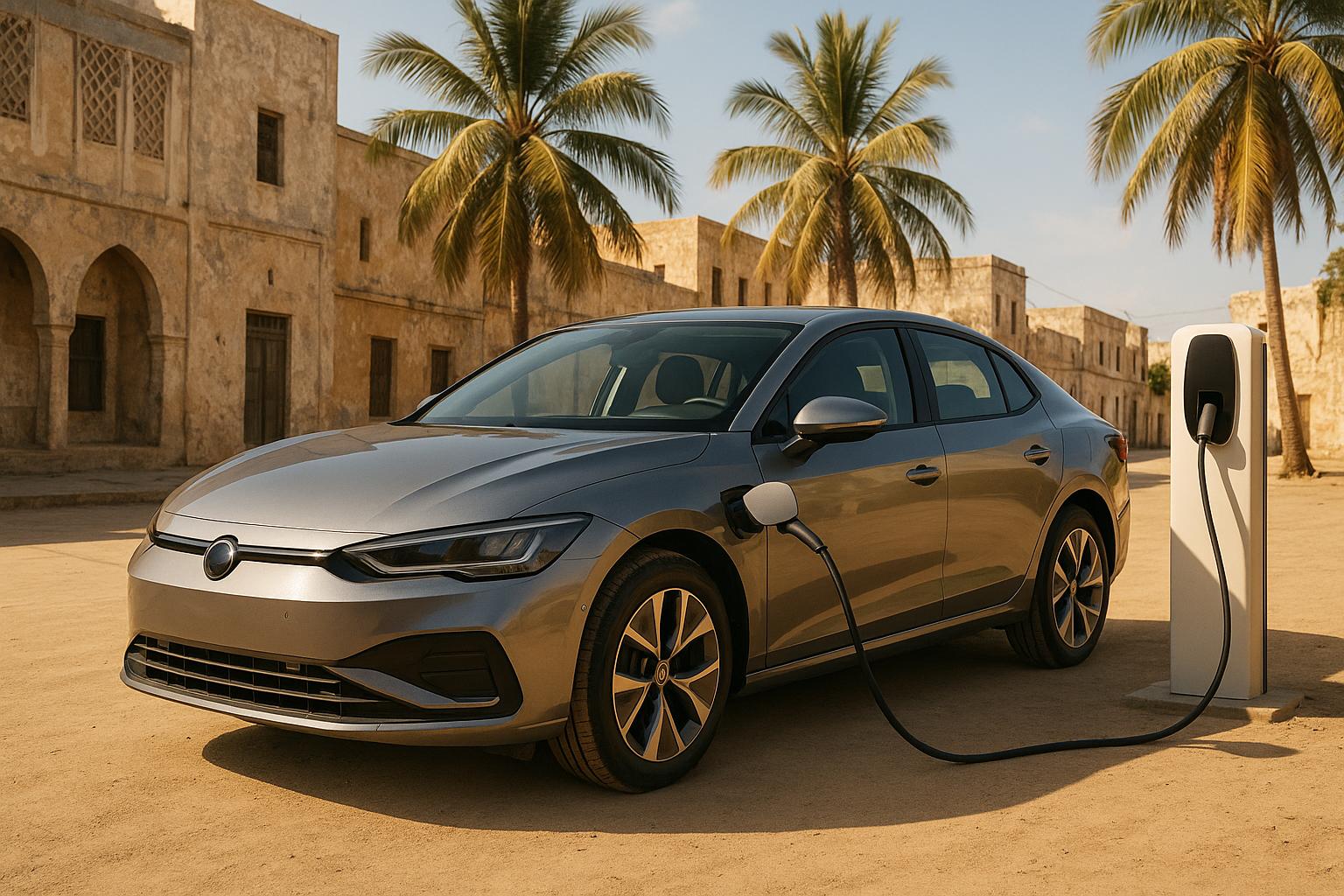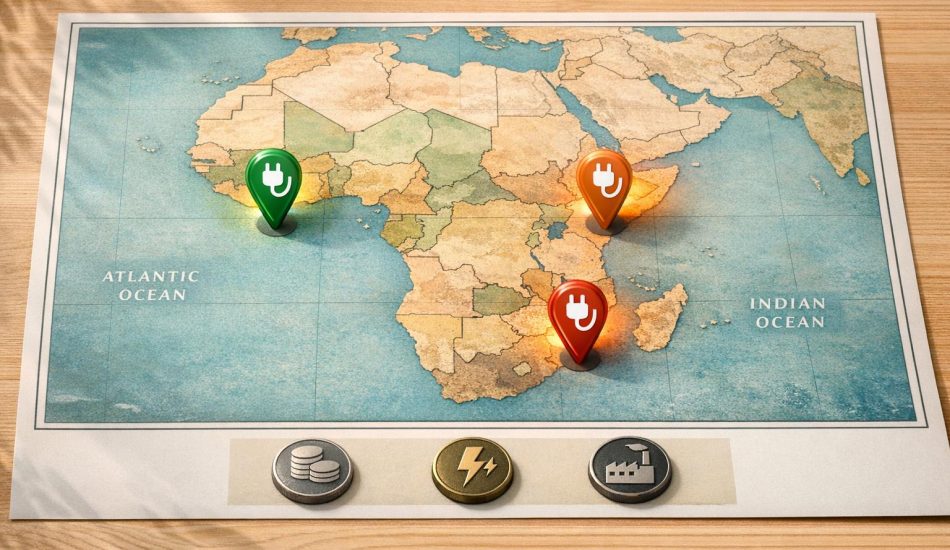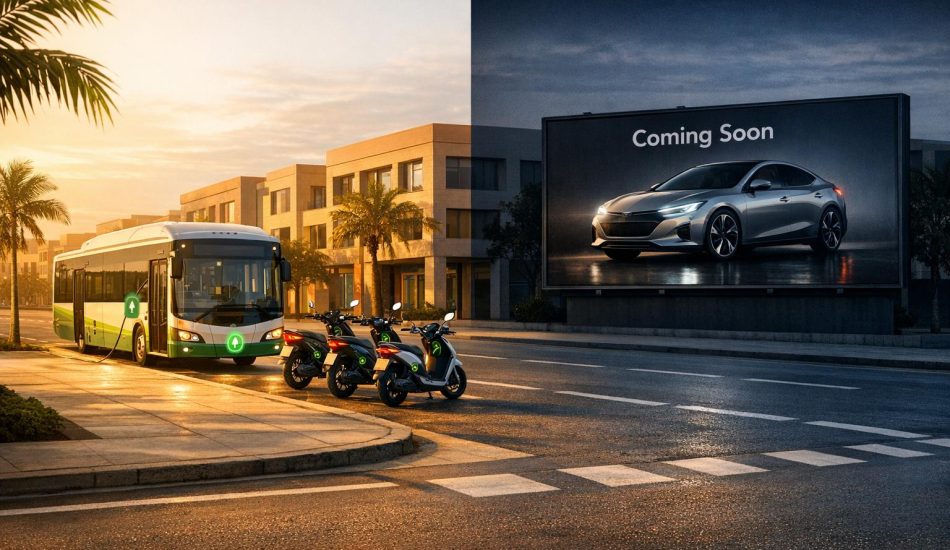
In Somalia, owning an electric vehicle (EV) is becoming easier due to tax exemptions and growing interest in modern transportation. Here’s what you need to know:
- Tax Breaks: The Somali government has waived VAT and customs duties on fully electric vehicles until December 2025.
- Available Models: Affordable options like the LINGBOX UNI ($4,800) and GEELY PANDA MINI BASE ($5,880) are ideal for city driving, while premium models like the BYD TANG EV 2024 ($34,700) offer advanced features for long-term use.
- Import Process: Key steps include preparing documents (e.g., proof of purchase, inspection certificates), understanding taxes, and working with clearing agents for smooth customs clearance.
- Challenges: Somalia’s hot climate can reduce EV battery life and range by up to 40%, so choosing models with thermal management systems is crucial.
- Charging Options: While public charging infrastructure is limited, home charging setups using solar power are practical and cost-effective.
Electric cars are a practical choice for Somali drivers, offering lower running costs and reduced reliance on fuel. With proper planning and maintenance, you can enjoy the benefits of EV ownership in Somalia.
Somalia CTN Procedure | Required for All Shipments to Somalia
Electric Car Models Available in Somalia
Choosing the right electric vehicle (EV) for Somalia involves balancing your budget with the challenges posed by local roads and the country’s hot climate. Many EVs suited for Somalia are imported through the Port of Berbera, and buyers can explore both new and used models to meet their needs.
New vs. Used Electric Cars
New EVs come with the latest battery technology, full warranties, and maximum range. However, they often carry a higher upfront price. On the other hand, used EVs are more affordable but may have reduced battery performance – an issue that becomes even more critical in Somalia’s intense heat.
Somalia’s climate can significantly affect EV batteries, with extreme heat reducing an EV’s range by up to 40%. If you’re considering a used EV, it’s essential to look for models equipped with robust thermal management systems to protect the battery and powertrain from temperature-related wear and tear. Additionally, opt for vehicles with range predictions that take both the local climate and road conditions into account.
Top Electric Car Models for Somalia
Taking affordability and performance into account, here are some top EV models that are well-suited for Somalia. With a team of over 200 professionals across five African countries, our platform ensures these vehicles are carefully selected and delivered.
Budget-Friendly Options
For less than $15,000, models like the LINGBOX UNI ($4,800) and the GEELY PANDA MINI BASE ($5,880) are excellent for city driving. These compact cars excel in urban areas like Mogadishu, where ease of parking and maneuverability are key.
Mid-Range Selections
In the $15,000–$25,000 range, you’ll find vehicles better equipped for Somalia’s varied driving conditions. The BYD QIN PLUS EV 135 Kw ($17,880) and the LEAPMOTOR C16 ($21,430) offer improved suspension and ground clearance. The DONGFENG FENGON WINDSTAR E380 ($23,300) stands out for its durability on rough roads.
Premium Models
For those willing to spend over $25,000, premium EVs deliver better performance and durability. The DONGFENG eπ 008 EV ($28,700) and the BYD TANG EV 2024 ($34,700) feature advanced cooling systems – essential for Somalia’s hot climate. Meanwhile, the LEAPMOTOR C11 PERFORMANCE ($31,300) combines a sturdy build with efficient energy management.
| Model | Price (USD) | Best For | Key Features |
|---|---|---|---|
| LINGBOX UNI | $4,800 | Urban commuting | Compact, affordable, easy parking |
| GEELY PANDA MINI BASE | $5,880 | City driving | Low maintenance, efficient |
| BYD QIN PLUS EV 135 Kw | $17,880 | Mixed urban/highway | Good range, reliable brand |
| LEAPMOTOR C16 | $21,430 | Family use | Spacious, modern features |
| DONGFENG eπ 008 EV | $28,700 | All conditions | Advanced cooling, durability |
| BYD TANG EV 2024 | $34,700 | Premium performance | High-end features, long range |
Commercial Vehicle Options
For businesses, models like the DONGFENG RICH 7 EV ($41,700) are ideal for cargo transport, while smaller vehicles such as the DONGFENG NanoBox ($8,300) are perfect for urban deliveries.
When selecting an EV, focus on models with high battery capacity and efficient cooling systems to withstand Somalia’s heat. Ground clearance and durable suspension systems are also crucial for navigating local road conditions. Lastly, ensure that spare parts and maintenance services for your chosen model are readily available in your region.
Somalia Electric Car Import Rules
Once you’ve decided on an electric vehicle (EV) model, the next step is navigating Somalia’s import rules. This involves understanding the required documentation, taxes, and inspection processes to ensure a smooth import experience.
Import Documentation Requirements
Bringing an electric car into Somalia requires specific paperwork, which can vary depending on the port of entry – Southern Somalia, Puntland, or Somaliland – and the vehicle’s country of origin. To avoid complications, it’s a good idea to consult with local clearing agents for the most up-to-date advice on documentation.
Typically, you’ll need standard import documents, including proof of purchase and compliance certificates. These are especially important given the recent introduction of new EV brands and models into the Somali market. Ensuring all required paperwork is in order is crucial for avoiding delays or penalties.
Once your documentation is ready, the next step is to review the taxes and fees associated with your vehicle import.
Import Taxes and Fees
Somalia currently offers substantial tax relief for electric vehicle imports. According to Minister of Finance Regulation (PMK) Number 10 of 2024, EVs enjoy a 0% import duty until December 2025. However, to qualify for this exemption, importers must obtain approval from the Minister of Investment or the Head of the Investment Coordinating Board (BKPM) and apply the facility code 87 for EVs. Without meeting these conditions, standard duties will apply.
Taxes and duties are calculated based on the vehicle’s CIF value (cost, insurance, and freight). These are outlined in the Somali Customs Tariff Law of 2022, with VAT and additional fees applied to the combined CIF value and duties. Importers should also budget for customs broker fees, which cover document filing and clearance. Somalia’s relatively low taxation rates in the region make EV imports particularly appealing, but staying updated on tariff changes is essential to avoid unexpected costs.
Vehicle Inspection Requirements
Before registering your EV in Somalia, it must pass mandatory inspections. After reviewing your documents, inspection agencies will physically examine the vehicle to ensure it complies with Somalia’s safety standards and matches the submitted paperwork. A pre-shipment inspection certificate from Bureau Veritas is required to confirm the vehicle’s compliance and safety standards before it arrives.
Given the unique aspects of electric vehicles, consulting local clearing agents is highly recommended. They can provide insights into additional requirements or considerations specific to EVs.
How to Import Your Electric Car
Bringing your electric car home has never been easier with EV24.africa. From browsing options to final delivery, the platform handles the logistics, so you can focus on picking the perfect EV for your lifestyle.
Purchase and Import Steps
Once you’ve familiarized yourself with the import rules, follow these straightforward steps to get your EV delivered.
Getting Started:
Explore the range of EV models available on EV24.africa. The platform sources vehicles from Europe, Asia (including China), North America, and Japan, offering a variety of models and price ranges to suit different preferences and budgets.
Request a Quote:
Reach out to EV24.africa for a detailed quote. They’ll provide a full cost breakdown and let you choose between flexible Incoterms options like Delivered Duty Paid (DDP) or Free on Board (FOB).
Vehicle Reservation:
Secure your chosen EV by making a reservation. EV24.africa offers multiple payment options and uses its extensive delivery network, with the Port of Berbera serving as the main hub for deliveries to Somalia.
Shipping and Delivery Details
EV24.africa works with trusted partners to ensure your vehicle’s safe delivery. Once it arrives at the Port of Berbera, licensed local clearing agents manage customs clearance to simplify the process.
Import Process Tips
Here are a few tips to make your import experience smoother:
- Double-Check Documentation:
Ensure all paperwork is accurate and cross-check details with your clearing agent. - Rely on Experts:
Simplify customs clearance by leveraging EV24.africa’s expertise. - Utilize Tax Exemptions:
Take advantage of Somalia’s EV tax exemptions by applying with facility code 87. - Stay in the Loop:
Keep the lines of communication open with EV24.africa and your local clearing agent to avoid delays during customs clearance.
sbb-itb-99e19e3
Using Your Electric Car in Somalia
Once your EV arrives, getting it ready for Somalia’s unique conditions is essential. While the country’s EV infrastructure is still in its early stages, smart planning can help ensure a smooth and reliable experience with your electric vehicle.
Charging Options and Home Setup
Interest in EVs is growing in Somalia’s urban areas, prompting initial efforts by both government and private companies to establish charging stations in major cities. These initiatives often incorporate solar power, leveraging the region’s abundant sunshine.
Setting Up Home Charging
For now, home charging is likely your most dependable option. Most EVs can charge using a standard 110V outlet, but this method is slow. Installing a 240V Level 2 charging station offers faster charging and is worth considering. Make sure to hire a professional for installation to ensure safety and proper setup.
Planning Longer Trips
Before heading off on a long journey, use apps like PlugShare to locate available charging stations along your route. To maintain your EV’s battery health, aim to keep the charge level between 20% and 80%. Once you’ve sorted out your charging needs, focus on regular maintenance to keep your EV running at its best.
Maintenance and Service
After setting up a reliable charging system, proper maintenance is key to ensuring your EV performs well over time. Electric vehicles require specialized care, so it’s important to find workshops with technicians trained in EV systems. While many components, such as shocks, tires, and steering, are similar to those in gas-powered cars, EV-specific parts like the battery and drivetrain need expert attention.
For routine jobs like tire rotations or brake servicing, general auto repair shops may suffice. However, more complex issues – especially those involving the battery or drivetrain – should be handled by specialized EV service centers. It’s worth noting that EV repairs can cost 30–35% more and take about 14% longer to complete. That said, EVs generally require less frequent maintenance thanks to features like regenerative braking, which helps brakes last significantly longer.
Safety First
Never attempt to service high-voltage components unless you’re properly trained. For warranty repairs, software updates, or major battery issues, stick to authorized dealerships.
Battery Care and Vehicle Performance
Taking care of your EV’s battery is crucial, especially in Somalia’s hot climate. High temperatures can impact battery performance and range. For example, at 95°F (35°C) or when using air conditioning, you might see a 15–17% reduction in range.
Managing Heat
Heat is a major factor in battery degradation. Lithium-ion batteries exposed to temperatures above 80°F (27°C) for long periods tend to degrade more quickly. High temperatures combined with high voltage or deep charging can accelerate this process.
"Heat is one of the most silent threats to EV battery health. The good news is, with a little knowledge and the right tools, drivers can minimize the damage and keep their vehicles running efficiently for years."
- Nick Zamanov, EV infrastructure expert at CyberSwitching
Practical Tips for Battery Care
To protect your battery, park in shaded areas and avoid prolonged exposure to direct sunlight. If possible, pre-cool your car while it’s plugged in, and charge during cooler times of the day, such as early morning or late evening. Avoid rapid charging during extreme heat, and don’t leave your car fully charged or completely drained for extended periods. Following the manufacturer’s recommendations and using smart chargers to monitor battery health can make a big difference.
Improving Overall Performance
To get the most out of your EV, drive at moderate speeds and use eco-driving modes to reduce strain on the battery and other systems. Keep your tires properly inflated and your car free of unnecessary weight. If your EV has features like battery saver and hill-hold modes, use them to your advantage. Models with liquid cooling systems can also help extend battery life. With proper care, EV batteries degrade at an average rate of just 1.8% per year, meaning your car could last 20 years or more.
Summary: Owning an Electric Car in Somalia
Owning an electric vehicle (EV) in Somalia has become a realistic option thanks to strong government support and a growing infrastructure network. The government has introduced tax exemptions that waive VAT and customs duties for 100% electric vehicles, making them more affordable and appealing to potential buyers.
For a smooth EV ownership experience, it’s crucial to choose the right model and adhere to the necessary import procedures. This process involves selecting a suitable vehicle, gathering the required documentation, and following the simplified import steps. Key documents include a certificate of origin, commercial invoice, bill of lading, packing list, insurance certificate, and a pre-shipment inspection certificate from Bureau Veritas.
Entry-level EV models start at around $8,000, with higher-end options available for those seeking more features. These prices become even more appealing when considering the tax exemptions and the lower long-term maintenance costs of EVs compared to traditional vehicles.
Electric cars bring several advantages: they eliminate fuel costs, reduce maintenance expenses, and produce zero direct CO2 emissions. Somalia’s abundant solar energy adds another layer of appeal, offering renewable charging solutions perfectly suited to the region’s sunny climate.
Infrastructure to support EVs is steadily expanding. Charging stations are being established in major cities like Mogadishu and Hargeisa, often using solar power to take advantage of the country’s plentiful sunshine. While the public charging network is still in its early stages, home charging setups remain a dependable option for daily use.
To ensure successful EV ownership, Somali drivers need to plan for charging needs, manage battery maintenance in the country’s high temperatures, and access skilled technicians for specialized repairs. With government incentives, expanding infrastructure, and clear environmental and economic benefits, electric vehicles are a practical and forward-thinking choice for Somali residents looking to embrace sustainable transportation. EVs are shaping up to be a smart solution for modern mobility in Somalia.
FAQs
What steps and documents are needed to import an electric car into Somalia?
To bring an electric car into Somalia, you’ll need to follow a structured process and gather the required paperwork. Begin by submitting a customs declaration. This generally involves providing a bill of lading, commercial invoice, certificate of origin, and an import license. Additional documents like the original certificate of registration, purchase invoice, and a valuation certificate for the vehicle may also be necessary.
Be sure to meet all Somali import regulations, which include paying any required import taxes and completing customs clearance procedures. Having the correct documents and following the rules carefully will help ensure a smoother process and minimize potential delays.
How does Somalia’s hot climate impact electric vehicles, and what can owners do to protect their EVs?
How Somalia’s Climate Impacts Electric Vehicles
Somalia’s hot climate presents unique challenges for electric vehicles (EVs), especially when it comes to battery performance and overall safety. High temperatures can cause EV batteries to wear out faster, which may reduce their efficiency and driving range over time. Additionally, the intense heat can lead to increased tire pressure, potentially affecting both safety and handling.
Here are a few ways to keep your EV running smoothly in such conditions:
- Park in shaded spots or garages to shield your vehicle from excessive heat.
- Make use of your EV’s battery cooling system, if it has one, to regulate temperature.
- Check tire pressure regularly to ensure it stays within the recommended range for safety and performance.
By following these steps, you can help your EV stay reliable and perform well, even in Somalia’s challenging heat.
What charging options are available for electric vehicles in Somalia, and how can solar power be used for home charging?
Somalia is gradually building its EV charging infrastructure, with around 20 public charging stations currently in operation. These stations are strategically located in places like parking lots and retail areas, offering a mix of AC chargers, DC fast chargers, and even newer options such as wireless charging. Although still in its early stages, the network is expanding, aiming to make EV charging more accessible throughout the country.
For home charging, solar power presents a fantastic solution due to Somalia’s abundant sunlight. Installing solar panels connected to a home EV charger can significantly cut down reliance on the grid and help save on energy costs. A well-planned solar system provides a sustainable and cost-effective way to power your vehicle, making it a smart choice in regions blessed with consistent sunshine.




